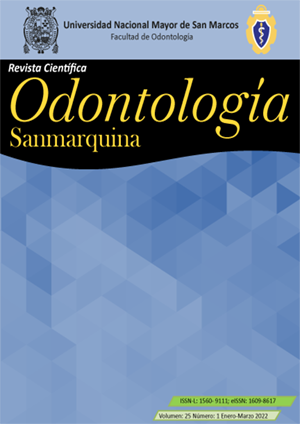Detection of drugs in saliva: methodological and legal aspects
DOI:
https://doi.org/10.15381/os.v25i1.22076Keywords:
Illicit drugs, Saliva, Diagnosis, Legislación de drogas, (source: MeSH NLM)Abstract
The analysis of drugs in saliva is a non-invasive alternative to demonstrate their presence in the body. The purpose is broad, but it has been used in forensic and legal medicine, especially for illicit drugs. The collection of saliva is not risky and does not require specialized personnel. The objective was to assess various methodological and validity aspects of the saliva drug test for the diagnosis of drug use. Likewise, some aspects related to drug legislation were analyzed. The psychoactive substances to be evaluated were marijuana, cocaine, amphetamines and opiates. A search was carried out in the Pubmed / MEDLINE, Embase, LILACS, Scopus, SciELO and gray literature databases. Identification of drugs in biological fluids was found to include immunochemical, chromatographic and spectrometric procedures. Positive results obtained by one technique must be confirmed with a second analysis based on different chemical or physical principles. Marijuana, cocaine, opiates and amphetamines, among other drugs, have been detected in saliva by various analytical methods, like immunoassay and gas chromatography / tandem mass spectrometry. In oral fluid, drugs of abuse can be detected for 5-48 hours post-consumption, at a low level of nanograms per milliliter. It was concluded that the detection of drugs in saliva is an option that is indicated in the event of suspected drug use, for signs or symptoms that suggest drug abuse, or for monitoring the user in a dependency treatment center. In the legal aspect, the use of drug tests in saliva is a possibility for certain circumstances.
Downloads
Downloads
Published
Issue
Section
License
Copyright (c) 2022 Enrique Rotemberg, Alicia Picapedra, Marcelo Kreiner

This work is licensed under a Creative Commons Attribution 4.0 International License.
AUTHORS RETAIN THEIR RIGHTS:
a. Authors retain their trade mark rights and patent, and also on any process or procedure described in the article.
b. Authors retain their right to share, copy, distribute, perform and publicly communicate their article (eg, to place their article in an institutional repository or publish it in a book), with an acknowledgment of its initial publication in the Odontología Sanmarquina.
c. Authors retain theirs right to make a subsequent publication of their work, to use the article or any part thereof (eg a compilation of his papers, lecture notes, thesis, or a book), always indicating the source of publication (the originator of the work, journal, volume, number and date).






